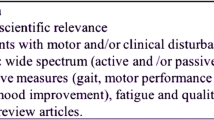Review of studies of music therapy provides evidence of its important role in the nondrug treatment of patients with acute and chronic diseases, including demyelinating disorders. Existing research has demonstrated the efficacy of music therapy in terms of both improving patients’ social skills, improving cognitive functions, decreasing the severity of depression and anxiety, and improving sleep and decreasing pain in patients with multiple sclerosis.
Similar content being viewed by others
References
B. D. Karvasarskii, Music Therapy. Psychotherapeutic Encyclopedia, Piter, St. Petersburg (2000).
G.-G. Deker-Fogt, Introduction to Music Therapy, Piter, St. Petersburg (2003).
G. D. Semenova, Music Therapy and Recuperative Medicine in the XXI Century, Akademiya Trinitarizma (2006).
L. S. Brusilovskii, Music Therapy. Handbook of Psychotherapy, Moscow (1985).
A. L. Bitova and I. S. Konstantinova, “The place of musical activity in a system of corrective work with children,” Autizm Narush. Razv., No. 2, 29 (2010).
G. Shanskikh, “Music as a means of corrective work,” Iskusstv. Shk., No. 5 (2003).
A. G. Popok, “Music therapy for children with restricted abilities,” Izv. Ross. Gos. Pedag. Univ. im. Gertsena, 150 (2012).
E. Nazaikinskii, The Psychology of Musical Perception, Muzyka, Moscow (1974).
P. Nordoff and S. Robbins, Therapy in Music for Handicapped Children, Gollancz, London (1985).
E. N. Kotysheva, “Musical psychological correction in the process of rehabilitation of children with limited health,” Omsk. Nauch. Vestn., No. 2, 76 (2009).
S. M. K. Brown, “Autism and music therapy: is change possible, and why music?” J. Brit. Mus. Ther., 8, No. 1, 15–25 (1994).
M. Boso, “Effect of long-term interactive music therapy on behavior profile and musical skills in young adults with severe autism,” J. Altern. Complement. Med., 13, No. 7, 709–712 (2007).
E. I. Gusev, I. A. Zavalishin, and A. N. Boiko, Multiple Sclerosis and Other Demyelinating Diseases, Mikosh, Moscow (2004).
H. Lengdobler and W. Kiessling, “Group music therapy in multiple sclerosis: initial report of experience,” Psychother. Psychosom. Med. Psychol., 39, No. 9–10, 369–373 (1989).
M. E. Wiens, M. Reimer, and H. L. Guyn, “Music therapy as a treatment method for improving respiratory muscle strength in patients with advanced multiple sclerosis: a pilot study,” Rehabil. Nurs., 24, No. 2, 74–80 (1999).
W. Schmid and D. Aldridge, “Active music therapy in the treatment of multiple sclerosis patients: a matched control study,” J. Music Ther., 41, No. 3, 225–240 (2004).
T. Ostermann and W. Schmid, “Music therapy in the treatment of multiple sclerosis: a comprehensive literature review,” Expert Rev. Neurother., 6, No. 4, 469–477 (2006).
K. S. Moore, G. O’Shea, G. C. McIntosh, and M. H. Thaut, “The effectiveness of music as a mnemonic device on recognition memory for people with multiple sclerosis,” Expert Rev. Neurother., 6, No. 4, 469–477 (2006).
L. J. Phillips and A. K. Stuifbergen, “The influence of positive experiences on depression and quality of life in persons with multiple sclerosis,” J. Holist. Nurs., 26, No. 1, 41–48 (2008).
S. V. Moreira, M. A. Moreira, and M. A. Lana-Peixoto, “Musical identity of patients with multiple sclerosis,” Arq. Neuropsiquiatr., 67, No. 1, 46–49 (2009).
W. Kullich et al., “Music therapy – effect on pain, sleep and quality of life in low back pain,” Wien Med. Wochenschr., 153, No. 9–10, 217–221 (2003).
A. Linnemann et al., “The effects of music listening on pain and stress in the daily life of patients with fibromyalgia syndrome,” Front. Hum. Neurosci., 9, 434 (2015).
Author information
Authors and Affiliations
Corresponding author
Additional information
Translated from Zhurnal Nevrologii i Psikhiatrii imeni S. S. Korsakova, Vol. 116, No. 2, Iss, 2, Multiple Sclerosis, pp. 74–77, February, 2016.
Rights and permissions
About this article
Cite this article
Boiko, E.A., Ivanchuk, E.V., Gunchenko, M.M. et al. The Potential of Music Therapy in Neurology Using Multiple Sclerosis as an Example. Neurosci Behav Physi 47, 570–572 (2017). https://doi.org/10.1007/s11055-017-0437-8
Published:
Issue Date:
DOI: https://doi.org/10.1007/s11055-017-0437-8




